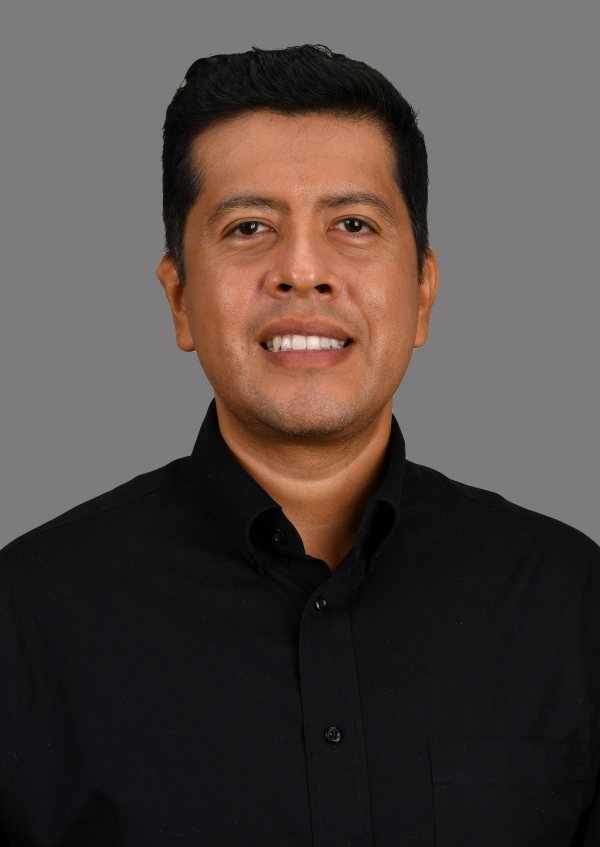Biography
Dr. Miramón started his research career in Microbiology by focusing on the plant pathogen Ustilago maydis, a basidiomycete responsible for the corn smut disease, at the Escuela Nacional de Ciencias Biologicas, IPN (Mexico City). He obtained a B.S. in Microbiology (QBP) and an M.S. studying the regulation of proteolytic enzymes in U. maydis.
In 2009, he initiated his doctoral studies under the mentorship of Dr. Bernhard Hube at the Hans Knoell Institute – Friedrich Schiller University Jena, Germany, where he earned his degree (Doctor rerum Naturalium) by researching the interactions of Candida albicans and the innate immune system.
In 2014, Dr. Miramón became a postdoctoral fellow in the research group of Dr. Lorenz at UTHealth, where he expanded his investigations into nutrient sensing in C. albicans and the emergent fungal pathogen C. auris. His expertise encompasses extensive genetic manipulation utilizing the CRISPR-Cas9 system as well as various infection models. In 2018, he was appointed as a Senior Research Associate.
Dr. Miramón joined the Department of Microbiology and Molecular Genetics faculty at McGovern Medical School in 2023.
Education
- B.S.
- Escuela Nacional de Ciencias Biologicas, IPN, Mexico, 2005
- M.S.
- Escuela Nacional de Ciencias Biologicas, IPN, Mexico, 2007
- Ph.D. (Doctor rerum Naturalium)
- Friedrich Schiller University, Jena, Germany, 2013
- Post-doctoral Fellow
- McGovern Medical School UTHealth, USA, 2014-2018
Areas of Interest
Research Interests
Fungal infections have become a significant clinical problem in recent decades. Chronic illnesses, medical procedures, and extensive and prolonged use of antibiotics are among the factors that worsen the seriousness of fungal infections. Candida albicans and other Candida species, including the emergent C. auris, represent a particularly challenging group of pathogens that require the highest attention to develop strategies to treat and prevent fatal infections.
The majority of C. albicans infections originate from naturally colonizing strains within the regular microbiota, rather than being acquired nosocomially. Consequently, it is imperative to gain a comprehensive understanding of C. albicans natural colonization of the host and its potential for causing disease in susceptible individuals. Nutrient acquisition and stress responses play pivotal roles in C. albicans ability to colonize and thrive within the host. Therefore, my research is focused on identifying uncharacterized factors associated with immune system resistance, as well as those enabling efficient colonization and persistence.
In the course of my research, I routinely employ reverse genetic screens driven by CRISPR-Cas9 technology to elucidate new insights into both known and uncharacterized genes in Candida spp.
Publications
Miramón P, Pountain AW, Lorenz MC. Candida auris-macrophage cellular interactions and transcriptional response. Infect Immun. 2023 Nov 16;91(11):e0027423. doi: 10.1128/iai.00274-23. Epub 2023 Oct 10. PubMed PMID: 37815367; PubMed Central PMCID: PMC10652981.
Cruz MR, Cristy S, Guha S, De Cesare GB, Evdokimova E, Sanchez H, Borek D, Miramón P, Yano J, Fidel PL Jr, Savchenko A, Andes DR, Stogios PJ, Lorenz MC, Garsin DA. Structural and functional analysis of EntV reveals a 12 amino acid fragment protective against fungal infections. Nat Commun. 2022 Oct 13;13(1):6047. doi: 10.1038/s41467-022-33613-1. PubMed PMID: 36229448; PubMed Central PMCID: PMC9562342.
Garbe E, Miramón P, Gerwien F, Ueberschaar N, Hansske-Braun L, Brandt P, Böttcher B, Lorenz M, Vylkova S. GNP2 Encodes a High-Specificity Proline Permease in Candida albicans. mBio. 2022 Feb 22;13(1):e0314221. doi: 10.1128/mbio.03142-21. Epub 2022 Jan 25. PubMed PMID: 35073760; PubMed Central PMCID: PMC8787483.
Miramón P, Pountain AW, van Hoof A, Lorenz MC. The Paralogous Transcription Factors Stp1 and Stp2 of Candida albicans Have Distinct Functions in Nutrient Acquisition and Host Interaction. Infect Immun. 2020 Apr 20;88(5). doi: 10.1128/IAI.00763-19. Print 2020 Apr 20. PubMed PMID: 32094252; PubMed Central PMCID: PMC7171245.
Miramón P, Lorenz MC. A feast for Candida: Metabolic plasticity confers an edge for virulence. PLoS Pathog. 2017 Feb;13(2):e1006144. doi: 10.1371/journal.ppat.1006144. eCollection 2017 Feb. Review. PubMed PMID: 28182769; PubMed Central PMCID: PMC5300112.
Miramón P, Lorenz MC. The SPS amino acid sensor mediates nutrient acquisition and immune evasion in Candida albicans. Cell Microbiol.2016 Nov;18(11):1611-1624. doi: 10.1111/cmi.12600. Epub 2016 May 27. PubMed PMID: 27060451; PubMed Central PMCID: PMC5501722.
